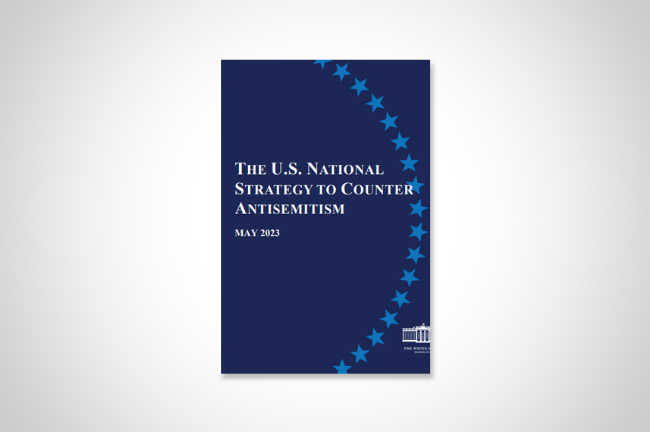You have /5 articles left.
Sign up for a free account or log in.

The White House
These are difficult times for educators trying to maintain a space for the unfettered exchange of ideas in a cultural and political environment that is erecting more legal and regulatory guardrails to define what crosses the line from permissible to impermissible discourse. With its recent “National Strategy to Counter Antisemitism,” the Biden administration offered its understanding of where that line exists in the matter of antisemitism. While the White House sought to move the focus from definitions to action, it could not avoid the former. And the difficult question is how to decide when anti-Israel criticism crosses into antisemitism. But far from offering clear guidance, the national strategy leaves the lines blurry and for universities to sort out at their own peril.
Antisemitism’s specter emanates across the political spectrum, and, according to all measures, it is rising at a terrifying rate everywhere, including, some allege, on college campuses. Some antisemitic language and actions are unambiguous, such as swastikas and circulation of accusations ripped from the pages of The Protocols of the Elders of Zion or Henry Ford’s The Dearborn Independent. But what about criticism of Israel? What is inside or outside the bounds? What about calling Israel an apartheid state? Supporting the boycott, divestment and sanctions (BDS) movement? Likening Israeli forces in the occupied Palestinian territories to Nazis?
Letters to the Editor
Readers have submitted
letters in response to this
essay. You can read
the letters here and here,
and view all of our letters
to the editor here.
Over the last several years, a group of activists and many but not all prominent Jewish American organizations have lobbied for the White House and state governments to unequivocally endorse the International Holocaust Remembrance Alliance definition of antisemitism. According to the IHRA definition, denial of the right of the Jewish people to self-determination is antisemitic. Faulting Israel in ways not normally used to criticize other democratic countries is, too.
Others, even within the Jewish community, have found such criteria vague and subjective. The first could bar any questioning of Zionism and gives Jews a privilege accorded to no one else—and that IHRA advocates routinely deny to Palestinians. The second seems to risk writing whataboutism into law and demands consistency found nowhere else in political life. Even IHRA has come to recognize that its definition cannot bear the weight of being legally binding—leading some guardians to seek to encode it not into legislation but instead through case law or by persuading officials to use it as a yardstick. Many who reject the IHRA definition do so because, in their interpretation, it is less about ending antisemitism and more about protecting Israel from criticism.
In response, a group of activists, scholars and public intellectuals crafted the Jerusalem Declaration on Antisemitism, which offered a definition that did not leave the door wide-open to almost any criticism of Israel.
The debate between these definitions is thus not so much about antisemitism but rather about criticism of Israel. And in the current context where the criticisms are mounting and becoming mainstreamed, defenders of Israel are viewed as becoming more insistent on having the IHRA definition become the quietly guiding spirit behind law and regulation of the land. But, significantly, the IHRA’s definition of antisemitism means that growing numbers of Jews can be seen as antisemites. Many Jewish Americans have reacted with horror at the current far-right Israeli government, others have drifted away from the centrality of Israel to Jewish identity and still others have embraced strong criticisms of what Israel has become. Such orientations are no longer on the margins of Jewish life in the United States—and it is perhaps that development that frightens supporters of current Israeli policy.
A major, behind-the-scenes debate regarding the national strategy was which definition the Biden administration would use. It did what all good politicians do when confronted with a no-win choice: it chose neither, sidestepping the critical question of how to know when criticism of Israel slips into antisemitism and who decides with a series of ambiguous moves. It references IHRA’s as the “most prominent” definition without endorsing it exclusively, mentions the existence of other definitions and acknowledges that the strategy is only domestic, allowing the Department of State to continue to rely on the IHRA definition in diplomacy and encourage its wider use.
In effect, the Biden administration passed the debate on to state governments, local municipalities, colleges and universities—and to the Department of Education, which handles Title VI complaints (and which is required under a Trump-era executive order to “consider” the IHRA definition). Defenders of Israel who follow the IHRA definition are lobbying governments and school administrators to sanction and punish critics of Israel for being antisemitic.
The clear intent is to insinuate strong criticisms of Israeli policy into working definitions of antisemitism used by bureaucrats. But it is not merely lawyers who are pursuing the strategy of conflating criticism of Israel and antisemitism. We have learned how these efforts can be used as a public cudgel. We recently wrote, along with two other colleagues, an essay titled “Israel’s One-State Reality,” published in Foreign Affairs. We presented our take on what has become a common view that the territory Israel controls should be seen as a single state deeply entrenching injustice and inequality.
We knew that this sharp-elbowed essay would get a strong response—and it did, much positive and some quite negative. But some quite prominent individuals focused much more on us as persons, charged us with the hidden aim of destroying Israel and described our article as antisemitic.
We have each been active members of our local Jewish communities, given our children Jewish educations, lived for periods in Israel and taught at Israeli universities. We did not want to come to the unwelcome conclusion that Israel, from the Jordan River to the Mediterranean Sea, is a single state that now includes a majority of non-Jews, many lacking elementary rights and protections. But we could not dispute the consensus that has emerged among international and Israeli human rights organizations that Israel meets conditions defined under international law as apartheid.
This is where definitions of antisemitism matter. The IHRA definition allows defenders of the current one-state reality to play the antisemitism card against those who voice views they want to silence. The effect would not be to prevent views from publication but to treat anyone assigning our article as discriminatory. Even if such efforts might often fail after extended inquiries (and they generally have up until now) the defenders of current Israeli realities would win by losing if they cause people to censor themselves or their syllabi. And as many university administrators know, accusations of antisemitism are often leveled and mobilized not by students or student organizations but rather by outside groups using threats of litigation and access to administrators.
Those who criticize Israel and those who seek to rebut such criticisms have valid and important points to make. Engagement rather than disqualification is called for. The Biden strategy’s ultimate effect will not be to protect debate but to transform disagreements about Israel into fights about antisemitism to be adjudicated with little guidance by college administrators and human resources officers, social media platforms and, inevitably, Congress. The tragic result is that this ambiguity can be used as a tool against very legitimate advocacy for Palestinians and undermines both healthy debate on Israel and the struggle against hatred of Jews.








